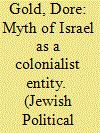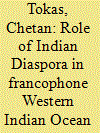|
|
|
Sort Order |
|
|
|
Items / Page
|
|
|
|
|
|
|
| Srl | Item |
| 1 |
ID:
086026


|
|
|
|
|
| Publication |
2009.
|
| Summary/Abstract |
As the twentieth century drew to an end, it became clear that a major change was taking place in the countries of the Arab world. For almost 200 years, those lands had been ruled and dominated by European powers and before that by non-Arab Muslim regimes -- chiefly the Ottoman Empire. After the departure of the last imperial rulers, the Arab world became a political battleground between the United States and the Soviet Union during the Cold War. That, too, ended with the collapse of the Soviet Union in 1991. Arab governments and Arab dynasties (royal or presidential) began taking over. Arab governments and, to a limited but growing extent, the Arab peoples were at last able to confront their own problems and compelled to accept responsibility for dealing with them.Europe, long the primary source of interference and domination, no longer plays any significant role in the affairs of the Arab world. Given the enormous oil wealth enjoyed by some Arab rulers and the large and growing Arab and Muslim population in Europe, the key question today is, what role will Arabs play in European affairs? With the breakup of the Soviet Union, Russia ceased to be a major factor in the Arab world. But because of its proximity, its resources, and its large Muslim population, Russia cannot afford to disregard the Middle East. Nor can the Middle East afford to disregard Russia.The United States, unlike Europe, has continued to play a central role in the Arab world. During the Cold War, the United States' interest in the region lay chiefly in countering the growing Soviet influence, such as in Egypt and Syria. Since the end of the Cold War, U.S. troops have appeared occasionally in the region, either as part of joint peace missions (as in Lebanon in 1982-83) or to rescue or protect Arab governments from their neighboring enemies (as in Kuwait and Saudi Arabia in 1990-91). But many in the Arab world -- and in the broader Islamic world -- have seen these activities as blatant U.S. imperialism. According to this perception, the United States is simply the successor to the now-defunct French, British, and Soviet empires and their various Christian predecessors, carrying out yet another infidel effort to dominate the Islamic world.
|
|
|
|
|
|
|
|
|
|
|
|
|
|
|
|
| 2 |
ID:
139134


|
|
|
|
|
| Summary/Abstract |
The protégé system that the Ottoman Empire encountered as the result of diplomatic relations with European powers later became a clear threat to the very existence of the empire. Among these powers, Britain, until the nineteenth century, executed its consular affairs via the Levant Company in the Middle East, but later employed local people, mostly non-Muslim Ottomans, as dragomans, consular agents and vice-consuls to execute its services in the region. The dragomans not only translated treaties and official documents, but also commented on the messages to and from the authorities and this gave them much more important roles. In this regard, members of the Mishaqa family served the British and later American interests under different posts ranging from dragoman, to consular agent and vice-consul. As they gained confidence, they were accorded British consular protection which provided them considerable privileges, and passed their duties to their sons. Unlike similar Levantine families who assumed dragomanship in the imperial centre as a household tradition, members of the Mishaqa family were deeply embedded in the local society and therefore could give insights on social and political changes in the Ottoman province of Damascus. After attaining British protection in 1840, members of the family served in British and American consulates until the beginning of the First World War. However, the protégé status of the family members paved the way for continued debates over their nationality and citizenship. This article attempts to present the basic codes of consular protection and Ottoman responses within the context of the story of Mishaqa family.
|
|
|
|
|
|
|
|
|
|
|
|
|
|
|
|
| 3 |
ID:
124367


|
|
|
|
|
| Publication |
2011.
|
| Summary/Abstract |
While modern Israel was born in the aftermath of the British Mandate for Palestine, which called for a Jewish national home, its roots preceded the arrival of the British to the Middle East. In that sense Britain was not Israel's mother-country, like France was for Algeria. Indeed, the Jews were already reestablishing their presence independently in their land well before the British and French dismantled the Ottoman Empire. As time went on, it became clear that the British Empire was not the handmaiden of Israel's re-birth, but rather its main obstacle. The accusation that Israel has colonialist roots because of its connection to the British Mandate is ironic, since most of the Arab states owe their origins to the entry and domination of the European powers.
|
|
|
|
|
|
|
|
|
|
|
|
|
|
|
|
| 4 |
ID:
128184


|
|
|
|
|
| Publication |
2014.
|
| Summary/Abstract |
Western Indian ocean islands of Seychelles, Mauritius, Madagascar, Reunion and Comoros have played significant role in migration of people and flow of goods across Indian Ocean for centuries. European powers in order to control sea lanes had firmly worked on acquiring military significance over the Western Indian Ocean region during colonial era. Revolution, Comoros, Madagascar, Seychelles and Mauritius have remain French colonies or were occupied by France for certain period of time.
|
|
|
|
|
|
|
|
|
|
|
|
|
|
|
|
| 5 |
ID:
146807


|
|
|
|
|
| Contents |
The conventional wisdom holds that Spain took only a limited interest in armored warfare until the European powers that intervened in the Spanish Civil War of 1936-39, Nazi Germany, Fascist Italy, and the USSR, demonstrated its importance on the battlefield. The author, tapping into the previously ignored professional military literature in Spain, reveals that, to the contrary, officers in the Spanish army early on took a lively interest in armor, an interest fed not only by what they knew of developments elsewhere in Europe but by the possibility of using tanks and other armored vehicles to advantage in Spain’s colonial wars in Morocco. It was not so much lack of interest that retarded Spanish development of armored units as lack of funds. Over the interwar years, upwards of 50 percent of the Spanish military budget was spent on personnel, particularly the army’s bloated officer corps.
|
|
|
|
|
|
|
|
|
|
|
|
|
|
|
|
| 6 |
ID:
115342


|
|
|
|
|
| Publication |
2012.
|
| Summary/Abstract |
The changes that have taken place in the last decades in the United States armed forces approach to waging wars have attracted a lot of attention in the strategic community. For some, the use of information technology, unmanned weapon systems, and precision-guided munitions represent a "revolution in military affairs" (RMA). But while the characteristics of change perfectly fit the needs of other countries such as the major European powers, the alleged RMA is not a hot topic among European and especially German defense specialists. Only some aspects of the RMA have found their way into the German armed forces. Efforts to transform the German armed forces are hampered by political controversy and difficult cultural premises.
|
|
|
|
|
|
|
|
|
|
|
|
|
|
|
|
| 7 |
ID:
112470


|
|
|
|
|
| Publication |
2012.
|
| Summary/Abstract |
World War I is generally viewed by both advocates and critics of commercial liberal theory as the quintessential example of a failure of economic integration to maintain peace. Yet this consensus relies on both methodologically flawed inference and an incomplete accounting of the antecedents to the war. Crucially, World War I began in a weakly integrated portion of Europe with which highly integrated powers were entangled through the alliance system. Crises among the highly interdependent European powers in the decades leading up to the war were generally resolved without bloodshed. Among the less interdependent powers in Eastern Europe, however, crises regularly escalated to militarized violence. Moreover, the crises leading to the war created increased incentives for the integrated powers to strengthen commitments to their less interdependent partners. In attempting to make these alliances more credible, Western powers shifted foreign policy discretion to the very states that lacked strong economic disincentives to fight. Had globalization pervaded Eastern Europe, or if the rest of Europe had been less locked into events in the east, Europe might have avoided a "Great War."
|
|
|
|
|
|
|
|
|
|
|
|
|
|
|
|
| 8 |
ID:
139332


|
|
|
|
|
| Summary/Abstract |
The Battle of Waterloo marked the end of a protracted European conflict that had lasted for twenty-three years. This period witnessed the seemingly inexorable rise of Napoleon, first to the position of general, then consul and finally emperor. It saw him face several kaleidoscopic coalitions of European powers, experience victory and defeat in battle, suffer exile, and return to rally France once again during the famous Hundred Days that ended at Waterloo. The question as to why this most famous of military strategists was defeated in June 1815 has long been a source of debate. Here, Beatrice Heuser explores the reasons why he lost the battle and – ultimately – the war, concluding that this was due to a broader failure of strategic vision on Napoleon's part.
|
|
|
|
|
|
|
|
|
|
|
|
|
|
|
|
|
|
|
|
|